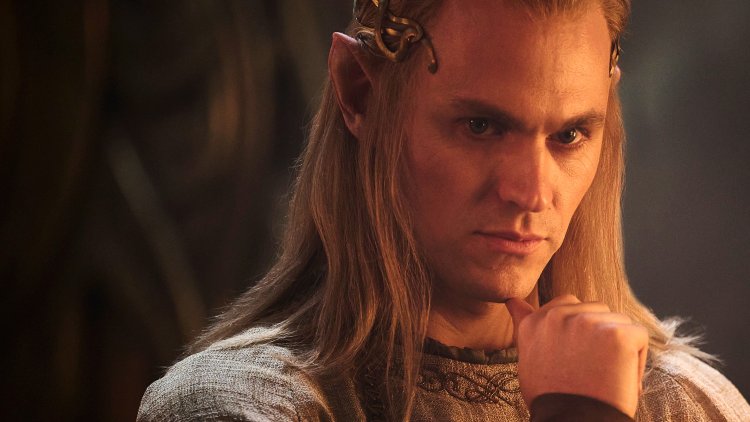The Sauron Problem
The mistake that The Rings of Power keeps making

When we return to the Second Age of Middle-earth, in the Season 2 premiere of The Lord of the Rings: The Rings of Power, we’re treated to a little bit of backstory. Sauron’s backstory, specifically, and it’s probably not what viewers versed in J. R. R. Tolkien’s supplemental material were expecting. The dark lord Sauron, scourge of Middle-earth, is giving a pep talk to his army of orcs when he is betrayed and seemingly slain by one of his lieutenants.
Sauron’s spirit survives, and he lingers in Middle-earth for a few thousand years until he takes on the form we all recognize, but the scene is indicative of the central issue confronting The Rings of Power. Even before it began, the show faced a nearly impossible task: How do you turn a few pages of novel appendices into compelling television with exciting plot arcs, lovable characters, and a scary villain? Two seasons in, the show still doesn’t have an answer, partly because of what I’ll call the Sauron Problem: Viewers know how the tale ends, so the series is trying to manufacture suspense by dragging out the story.
In many ways, the second season follows many of the same patterns as the first. The elves are still worried that their power, whatever that means in the context of the show, is fading, and they’re looking to objects of magic for aid. The Harfoots are still traveling inland with their amnesiac friend known only as the Stranger, who is trying to find out his identity. The orc army is terrorizing the East. The dwarves are largely insulated from the rest of the world in their mines. The men of Númenor need a new king. Sauron has a new hairdo and is tricking someone else into doing his dirty work.
It’s starting to feel like churn. The show has condensed Tolkien’s nearly 4,000-year timeline of events down to a few decades so that all the key players in the saga of the One Ring can be on-screen at once, and the episodes manage to feel both overlong and cramped. So much has been added to pad out the show’s trajectory and provide tonal suspense to an epic that fundamentally doesn’t need it.
Sauron, in particular, seems like the true victim of this narrative stretching, as the show keeps spinning the once and future dark lord in confusing new directions. Is he supposed to be relatable? Is he supposed to be an antihero? Is the audience being steered toward empathy for his point of view, so the show can “surprise” us later by revealing that he’s been evil this whole time?
It is possible to build a multi-season show out of what is essentially a prologue to the main story. HBO’s House of the Dragon, a natural comparison to The Rings of Power in more ways than one, dramatizes the devastating Targaryen civil war dubbed the Dance of the Dragons, which has reached near-mythic status by the start of Game of Thrones. House of the Dragon finds dramatic tension by working alongside viewers’ awareness rather than fighting against it. There is an uncomfortable yet addictive sense of doom in watching characters we’ve come to love being pushed closer to the point of no return.
The Rings of Power is not as grimdark as House of the Dragon tends to lean, focusing instead on the ethereal, magical beauty conveyed by Tolkien’s writing. It is very much aware that it is a prequel and relishes in foreshadowing, whether via recycled lines of dialogue from the books or winking introductions of key characters and locations. Spooky string music plays every time anyone looks at or even thinks about a ring. But this approach is at odds with the false suspense the rest of the show attempts to concoct. If we’re expected to have the foresight necessary to understand these hints, then why are we twiddling our thumbs waiting for Sauron to be revealed (again) or for the Stranger to learn his name (which many fans may already have guessed)?
The main impetus behind The Rings of Power seems to be: How can we keep this going? With five seasons planned for a series that has a shockingly hefty price tag (rumored to be about $1 billion already), Amazon Prime Video would naturally want one of its biggest marquee assets to last. That’s the problem with premium television in the streaming era. It’s all so fabulously expensive that it must keep making a case for itself to continue beyond the usual allotment of two or three seasons. The simplest way to do that is to deliver twists and reveals and finale cliffhangers that will keep viewers guessing and invested. The Rings of Power doesn’t have to be hampered by the fact that its ending was spoiled 69 years ago. It just needs to stop pretending we don’t know who the bad guy is.
What's Your Reaction?




















